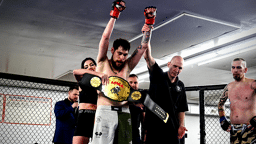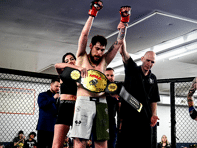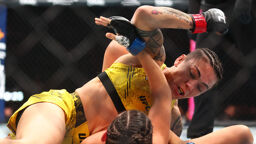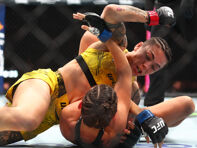Despite a watershed year for inclusion in sports, transgender athletes are still beleaguered both in the arena and outside of it. They are subjects of scrutiny, harsh criticism and sophomoric ridicule regardless of the outcome in the contest.
Yet from neighborhood playing fields to the biggest stages in sports, trans people this year showed a will to compete and make their mark in the game.
On Sept. 10, 2021 a fighter named Alana McLaughlin — a 38-year-old debutante and the first trans woman to step into a professional MMA cage since Fallon Fox’s last match seven years ago — made an entrance into history.
What set her apart, as much her story and the effort she put into preparing for the match ahead, was a loud message that the 2021 Outsports Transgender Athlete Advocate of the Year sent without saying a word.

A strong, confident fighter with a determined look and stride bounded toward the cage. A flowing azure-salmon-cream flag, the colors representing transgender pride and resistance, created a wake behind her. The T-shirt she wore exclaimed these words: END TRANS GENOCIDE. — Outsports, September 12, 2021
Holding a trans pride flag, McLaughlin proudly marched toward the cage and a waiting French fighter named Celine Provost, as a nation saw anti-trans legislation grow like weeds in a field. It has seen the ugliness of violence against trans people surging toward the record number we see now.
Anti-trans sentiment grew this year as trans visibility and representation in sports has roared upward from elected officials, to popular entertainment, to sports at the highest level.
Amid that backdrop was this moment, and it touched a legend who flew in to see the bout.
“She came out in her first MMA fight as an out and proud transgender woman,” Fallon Fox said. “That was a pretty amazing thing to see. I was sitting there watching history.”
The fight was a microcosm of a life of a survivor. The first round saw McLaughlin weathering Provost’s accurate punches. It mirrored a difficult youth growing up queer in South Carolina, the “Buckle of the Bible Belt” as she termed it.

Finding a way to stay on her feet through that round — and ensuing rounds — was nothing new. She did that while coming of age in the U.S. Army, becoming a Special Forces troop, doing a tour of duty in Afghanistan, and leaving the military in 2010.
“If I did not transition I would be dead,” McLaughlin said to Outsports in a July interview . “For me, it’s a slog. It was a hard fight, an uphill battle. It was like Special Forces training. You don’t know when it ends. They just tell you to go. It’s been a process.”
Along the way she set a goal of getting in the cage and fighting. Motivated by Fox’s prior exploits, McLaughlin’s dreams became a plan.
“I’m 38, so if I’m going to do anything serious competitive athletically, like now is the time,” she said. “Every fighter’s got an expiration date, and I want to do it while I still can.”
Part of what led to the debut was Fox herself. Combate Global reached out to Fox seeking a transgender fighter with potential. Fox pointed out McLaughlin, whom she helped to train and mentor.

The collaboration paid off in how the fight ended. McLaughlin got past Provost’s skillful hooks and jabs to force a takedown.
Once McLaughlin forced the boxing technician into a grapple on the canvas, she got in position to apply a textbook rear naked choke.
Provost tapped out and McLaughlin had her first career win in her first pro fight.
Since that night, McLaughlin has continued to train for her next opportunity to fight. She also has been a voice for other trans people in these difficult times.

“If we want to see more trans athletes, if we want to see more opportunities for trans kids, we’re going to have to work out way into those spaces and make it happen,” she said. “It’s time for trans folks to be in sports and be more normalized.”
Other Honoree
Laurel Hubbard: To say that New Zealand weightlifter Laurel Hubbard made a climb to get to the Olympic Games is an understatement.
After about five years of fighting back from injury, brickbats, misgendering, shaming and vitriol since earning two silver medals at the 2017 International Weightlifting Federation World Championships, Hubbard reached the summit she worked for: the Olympic Games in Tokyo.

However, her Olympic dream fizzled on the platform with three failed attempts. The second looked good but was overruled by the judges and was considered a failed try.
“Thank you so very much for your interest in my humble sporting performance tonight,” she said in a statement to reporters. “I know from a sporting perspective I did not live up to the standards I put upon myself.”

It was a cruel ending for an athlete who had been through a great deal just to show up.
An injury suffered in the 2018 Commonwealth Games nearly ended her career. She got healthy in time for IWF Worlds in 2019 and a promising sixth-place finish.
She had to scramble to make the Olympic field at 87+ kg and the COVID pandemic affected the worldwide fight for qualifying points. Ironically, a victory at the Weightlifting World Cup just weeks before the COVID pandemic stopped the world in 2020 was a huge step toward her earning a spot in Tokyo.
The intensely shy athlete had to endure a worldwide barrage of criticism, much of it from “gender critical” voices and certain press outlets that place a premium on transphobia. Save the occasional prepared statement, Hubbard avoided all media, even in her homeland.

She plans to stay away from the harsh media glare in the future as well.
“I’ve never been involved in sport because I’m looking for publicity, profile or exposure,” Hubbard told a small group of reporters in a press conference the day after she competed in Tokyo. “While I recognize that my involvement in sport is a topic of considerable interest to some, in some ways I’m looking forward to this being the end of my journey as an athlete and the attention that comes from it.
“As we move into a new and more understanding world, people are starting to realize that people like me are just people. We are human, and as such I hope that just by being here is enough.”
It may have been the end of Hubbard’s journey, but it paved a road for others to follow.







































